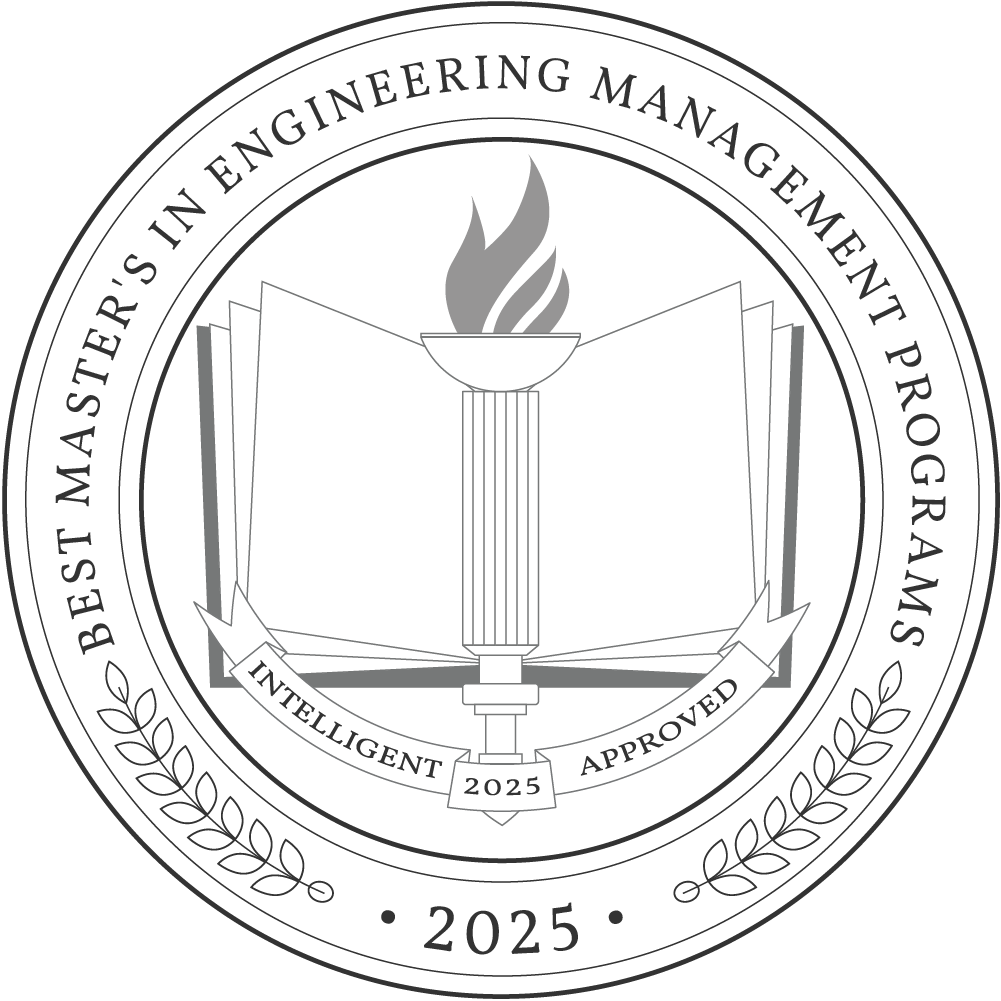For engineers seeking senior-level leadership roles, earning a master’s in engineering management (MEM) degree is an excellent way to attain your goals. These programs are designed to elevate experienced engineers into skilled managers, earning a median salary of $159,920. Demand for these positions is projected to increase by 4% over the next decade. An MEM provides you with the leadership and technical skills necessary to thrive at the intersection of engineering and management, preparing you for a rewarding career in multiple industries.
Typically, completing this degree takes 18 months to two years for full-time students, with an average tuition cost of $19,749 for the 2020-2021 academic year – making it an investment in your future leadership capabilities and career trajectory.
Why Trust Us
The Intelligent.com Higher Education Team is dedicated to providing students with independent, equitable school and program rankings and well-researched resources. Our expert-driven articles cover topics related to online colleges and programs, paying for school, and career outlooks. We use data from the U.S. Department of Education’s College Scorecard, the National Center for Education Statistics, and other reputable educational and professional organizations. Our academic advisory team reviews content and verifies accuracy throughout the year for the most current information. Partnerships do not influence rankings or editorial decisions.
- Analyzed over 2,000 national, accredited, and nonprofit colleges and universities
- 800+ rankings pages are reviewed and updated yearly
- Content is informed by reputable sources, surveys, and interviews with academic advisors and other experts
- Over 100 data points are reviewed for accuracy and quality throughout the year, including sources
How we rank schools
Our list features the best Engineering Management degree programs at top colleges nationwide. Each school featured is a nonprofit, accredited institution — either public or private — with a high standard of academic quality for post-secondary institutions.
We evaluated each school’s program on tuition costs, admission, retention and graduation rates, faculty, reputation, and the student resources provided for online students. We collected data from trusted sources like the National Center for Education Statistics, individual school and program websites, school admissions counselors, and other data sources. Then, we calculated the Intelligent Score on a scale of 0 to 100 based on the following criterion:
Academic Quality:
- Admission rate versus enrollment rate
- Retention rate of students who return after year one
- Accreditation status (regional and programmatic)
- Nonprofit status, both private and public institutions
Graduation Rate
- Overall graduation rate
- Total number of currently enrolled students, including diversity metrics
- Student-to-faculty ratio
Cost and ROI
- In-state and out-of-state per-credit tuition rates and fees
- Required credits to graduate
- Earning potential after graduation
- Availability of federal student loans, scholarships, and other financial aid options
Student Resources
- Available student services for online-only and hybrid programs
- On-campus amenities like tutoring centers and the number of libraries
Read more about our ranking methodology.
Best 21 Accredited Master’s in Engineering Management Programs
FiltersInstitution Type
Status
- Intelligent Score
- Alphabetically By University Name
- Acceptance Rate
- Enrollment
- In-state Graduate Tuition
- Out-of-state Graduate Tuition
- In-state Undergraduate Tuition
- Out-of-state Undergraduate Tuition

Stanford University
Intelligent Score: 99.7In-state: $55,473
Out-of-state: $55,473
In-state: $54,315
Out-of-state: $54,315
SAT: 1420-1570
ACT: 31-35
$1,391
On-Campus
WASC Senior College and University Commission
45

Massachusetts Institute of Technology
Intelligent Score: 99.15In-state: $53,450
Out-of-state: $53,450
In-state: $53,450
Out-of-state: $53,450
SAT: 1510-1580
ACT: 34-36
$516
On-Campus
New England Commission of Higher Education
66

Duke University
Intelligent Score: 98.84In-state: $55,880
Out-of-state: $55,880
In-state: $57,900
Out-of-state: $57,900
SAT: 1470-1570
ACT: 34-35
$2,144
On-Campus, Online
Southern Association of Colleges and Schools Commission on Colleges
31

Colorado School of Mines
Intelligent Score: 98.74In-state: $16,650
Out-of-state: $37,350
In-state: $16,650
Out-of-state: $16,650
SAT: 1270-1440
ACT: 28-33
In-State: $618
Out-of-State: $1,386
On-Campus
Southern Association of Colleges and Schools Commission on Colleges
30

Columbia University
Intelligent Score: 92.48In-state: $57,864
Out-of-state: $57,864
In-state: $49,024
Out-of-state: $49,024
SAT: 1460-1570
ACT: 33-35
$2,362
On-Campus
Middle States Commission on Higher Educatio
36

University of Michigan - Dearborn
Intelligent Score: 90.41In-state: $16,520
Out-of-state: $53,669
In-state: $24,344
Out-of-state: $24,344
SAT: 1340-1520
ACT: 31-34
In-State: $506
Out-of-State: $960
On-Campus
Higher Learning Commission
35

Virginia Tech
Intelligent Score: 89.73In-state: $32,274
Out-of-state: $36,090
In-state: $44,444
Out-of-state: $44,444
SAT: 1210-1410
ACT: 26-32
In-State: $846
Out-of-State: $1,705
On-Campus, Online
Southern Association of Colleges and Schools Commission on Colleges
31

Dartmouth College
Intelligent Score: 89.67In-state: $57,796
Out-of-state: $57,796
In-state: $57,796
Out-of-state: $57,796
SAT: 1440-1560
ACT: 32-35
$1,516
On-Campus
New England Commission of Higher Education
42

Texas A&M University
Intelligent Score: 88.65In-state: $8,395
Out-of-state: $36,849
In-state: $6,775
Out-of-state: $6,775
SAT: 1160-1380
ACT: 26-32
In-State: $425
Out-of-State: $966
On-Campus
Southern Association of Colleges and Schools Commission on Colleges
30

North Carolina State University
Intelligent Score: 87.5In-state: $6,535
Out-of-state: $26,654
In-state: $9,095
Out-of-state: $9,095
SAT: 1230-1410
ACT: 27-32
In-State: $525
Out-of-State: $1,635
On-Campus
Southern Association of Colleges and Schools Commission on Colleges
30

University of Florida
Intelligent Score: 86.91In-state: $4,477
Out-of-state: $25,694
In-state: $10,770
Out-of-state: $10,770
SAT: 1290-1460
ACT: 29-33
In-State: $530
Out-of-State: $1,255
On-Campus
Southern Association of Colleges and Schools Commission on Colleges
32

University of Texas at Austin
Intelligent Score: 85.1In-state: $11,448
Out-of-state: $40,032
In-state: $12,028
Out-of-state: $12,028
SAT: 1210-1470
ACT: 26-33
$1,666
On-Campus
Southern Association of Colleges and Schools Commission on Colleges
30

Lehigh University
Intelligent Score: 84.94In-state: $54,790
Out-of-state: $54,790
In-state: $27,000
Out-of-state: $27,000
SAT: 1260-1433
ACT: 29-33
$1,545
On-Campus
Middle States Commission on Higher Educatio
30

University of Minnesota
Intelligent Score: 83.15In-state: $13,318
Out-of-state: $31,616
In-state: $17,580
Out-of-state: $17,580
SAT: 1240-1460
ACT: 25-31
In-State: $1,593
Out-of-State: $2,465
On-Campus
Higher Learning Commission
30-31

Johns Hopkins Whiting School of Engineering
Intelligent Score: 82.03In-state: $54,160
Out-of-state: $54,160
In-state: $57,010
Out-of-state: $57,010
SAT: 1470-1560
ACT: 34-36
$2,094
On-Campus
Middle States Commission on Higher Educatio
30

Washington University in St. Louis
Intelligent Score: 81.96In-state: $56,300
Out-of-state: $56,300
In-state: $56,300
Out-of-state: $56,300
SAT: 1480-1560
ACT: 33-35
$2,688
On-Campus
Higher Learning Commission
30

Northwestern University
Intelligent Score: 80.43In-state: $58,227
Out-of-state: $58,227
In-state: $56,067
Out-of-state: $56,067
SAT: 1430-1550
ACT: 33-35
$2,044
On-Campus
Higher Learning Commission
36

Cornell University
Intelligent Score: 80.42In-state: $58,586
Out-of-state: $58,586
In-state: $29,500
Out-of-state: $29,500
SAT: 1400-1540
ACT: 32-35
$2,173
On-Campus
Middle States Commission on Higher Educatio
30
How to Choose a Master’s in Engineering Management Program
Choose your area of study
Choosing an area of study within the broader field of engineering management is often helpful for aligning your educational experience with your future career goals. Options will vary depending on the program but may include project management, supply chain management, technical sales and marketing, and operations management.
Those interested in organizing and leading teams will excel in project management, while analytical thinkers focused on efficiency and logistics will thrive in supply chain management. Strong communicators with a solid foundation in engineering knowledge may be well-suited for technical sales and marketing, and individuals passionate about optimizing processes and technology for peak performance may enjoy operations management.
Regardless of your specialization, you’ll develop a unique skill set, prepare yourself for a specific role, and boost your competitiveness in the job market.
Research schools and programs
After deciding on a specialization, it’s time to research potential schools and programs. Consider asking the following questions to guide your research:
- What are the program’s core courses and electives?
- How does the curriculum align with my career goals?
- What practical experiences — like internships and projects — are integrated into the program?
- What are the faculty’s backgrounds and areas of expertise?
This information can be found on program websites, at information sessions or open houses, and from admissions counselors.
Prepare for tests and applications
Once you’ve shortlisted your preferred schools, early preparation for tests and applications is crucial. Start gathering transcripts and letters of recommendation at least two to three months in advance to avoid any last-minute rushes. You’ll also want to write a personal statement highlighting your motivations, experiences, and professional goals per the program’s values. If GRE scores are required, enrolling in a test prep program well in advance can improve your chances of success.
Select your program
Upon receiving acceptance letters, you may have a significant decision to make. Fortunately, you can make this a more straightforward choice by evaluating a few key factors. Consider the alignment of the program’s curriculum with your career goals, the quality and expertise of the faculty, and the network opportunities it provides. Importantly, evaluate the overall cost of attendance and the availability of financial aid, scholarships, and grants, as this can increase the affordability of your education.
Determine how you’ll pay for your degree
For many students, earning their graduate degree can seem like a considerable expense, but you can make it more affordable by strategically utilizing financial aid resources.
Prioritize scholarships and grants first, as these do not require repayment and can significantly reduce out-of-pocket expenses. Assistantships offer tuition waivers or stipends in exchange for research or teaching duties, providing both financial and professional benefits. If you’re currently employed, be sure to ask your employer about tuition reimbursement programs, as these can also offset costs. In cases involving financial gaps, consider federal loans — which offer lower interest rates and more flexible repayment plans compared to private loans.
What Can You Expect From a Master’s in Engineering Management Program?
A master’s in engineering management (MEM) combines technical expertise with essential management skills – designed for engineers aspiring to lead. Often completed in 18 months to two years, these programs provide professionals with a comprehensive understanding of project management, financial analysis, strategic planning, and leadership within technical environments.
As a student, you’ll engage in project-based coursework, replicating real-world challenges and honing your ability to manage complex engineering projects, lead teams, and make data-driven decisions. This practical approach improves learning and boosts your future employability by providing tangible skills and experiences highly valued in the job market. Upon graduation, you’ll be a highly competent engineering manager, ready to tackle leadership roles in technology-driven industries, with the versatility to adapt and thrive in rapidly evolving work environments.
Potential courses you’ll take in a master’s in engineering management program
- Project Management for Engineers: A fundamental component in most curriculums, this course provides students with a solid foundation in project management – including planning, scheduling, budgeting, and resource allocation, specifically for engineering projects. The focus is on applying project management tools and techniques to ensure successful outcomes in technical environments.
- Systems Engineering and Analysis: Students explore the principles and practices of systems engineering, including the design, integration, and management of complex systems. These courses emphasize a holistic view of engineering projects, optimizing performance, reliability, and sustainability.
- Engineering Economics and Financial Analysis: This course provides an in-depth understanding of financial principles relevant to engineering projects, such as cost-benefit analysis, investment appraisal, and risk analysis. Students learn to make informed financial decisions that maximize project value and efficiency.
- Leadership in Technical Organizations: This course focuses on the human element of engineering management. It teaches leadership theories and practices, communication skills, and team dynamics. Students learn to lead teams, manage conflict, and foster innovation within technical organizations.
Master’s in Engineering Management Degree Frequently Asked Questions
How do I apply to a master's in engineering management degree program?
Requirements for a MEM degree program can vary by institution, but many share similar criteria, including the following:
- A bachelor’s degree in engineering or a related field
- A competitive GPA (usually 3.0 or above)
- GRE scores (optional for some programs)
- Letters of recommendation
- Statement of purpose
- Relevant work experience (preferred by some programs)
Don’t hesitate to contact an admissions counselor for guidance through the application process. Doing so can provide personalized advice, help clarify program expectations, and increase the chances of submitting a competitive application that aligns with the program’s objectives and values.
How much does a master's in engineering management degree cost?
The cost of these degrees varies by institution, but the average cost for graduate degrees for the 2020-2021 academic year was $19,749. Beyond tuition, you’ll want to budget for textbooks, course materials, commuting costs, and, if necessary, relocation and housing expenses. These additional costs can significantly impact the overall expense of obtaining your degree.
It’s crucial to consult with a financial aid counselor at your school to get a detailed estimate of the total cost of attendance. They can also provide information on financial aid options, scholarships, and grants you may qualify for, helping make your educational goals more affordable.
How long does it take to earn a master's in engineering management degree?
Earning this degree takes 18 months to two years for full-time students and three to four years for part-time students. Full-time enrollment allows quicker completion and immersion in the program, which is ideal for those eager to advance their careers. While extending the time to graduation, part-time study offers flexibility for working professionals balancing their careers with continuing their education.
Regardless of your enrollment type, you’ll also want to pay attention to the program’s total number of required credits, as this can vary by institution. Generally speaking, programs requiring more credits will take longer to complete.

